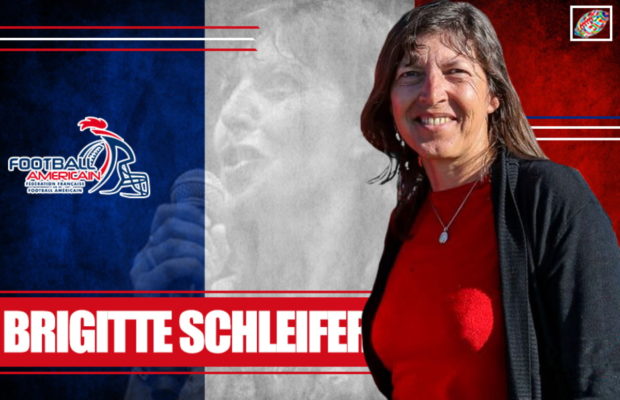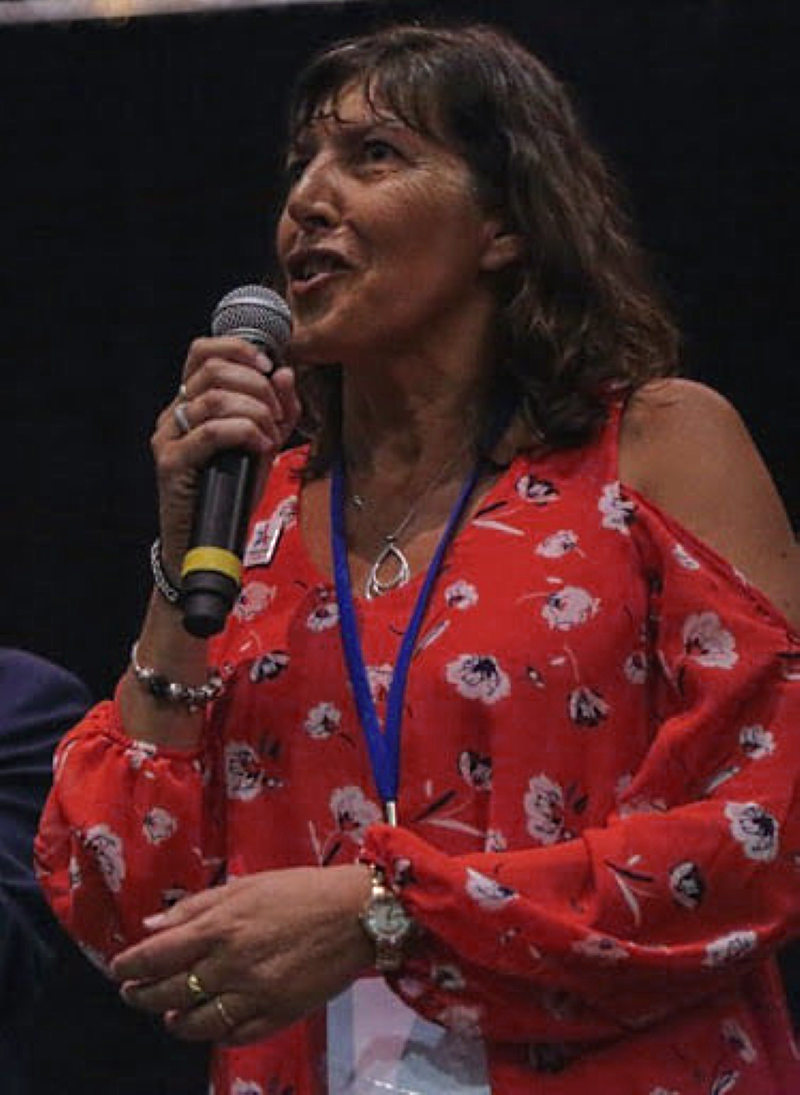French federation president Brigitte Schleifer overcomes gender barriers, political turmoil to lead France through crisis

Presidents of national football federations tend to have a distinct look and background. They are men, usually grey-haired, and have years of playing or coaching experience under their belt. If you were to look up the definition of an old-guard boys club, American football leadership might well be the picture beside it.
Brigitte Schleifer does not fit that image.
The President of France’s national federation came to her position via an unusual path, but has risen to the occasion. Not long ago American football was a foreign concept, now she is leading one of Europe’s largest federation through the current crisis.
Unlike most federation presidents, Schleifer’s football journey began as an active cheer mom.
“They needed a judge in the club to participate in competition, so that’s how I got involved a little bit in cheerleading,” she explains.
A frequent volunteer to begin with, it wasn’t long before Schleifer was deeply embedded in the national competition circuit. In 2015, she was approached by members of the FFFA to run for the position of Secretary General and help fulfill France’s legal requirement of 25% female leadership on organizational boards of their size. She jumped at the opportunity.
“I had some time and it was a new challenge, an opportunity to grow my personal knowledge.”
She assumed the position in 2016 and quickly had to learn about the non-cheerleading aspects of the FFFA’s mandate.
“I don’t like doing things half-way, so once I became Secretary General I made sure to take interest in all three disciplines,” Schleifer explains. “Even if my focus was mostly on cheerleading, I was involved in several committees where we would discuss a little bit of everything, from flag football to men’s tackle. That’s how I got to know American football.”
Her time as Secretary General was to be short lived. In December of 2017, political upheaval came to a head at the FFFA’s general assembly and the sitting President was forced to resign. Schleifer was quickly tapped to step into the role.
“Becoming president was more or less about ensuring the continuity of projects that were already underway in the Federation,” she says.
Unelected and coming from a more niche background, Schleifer faced significant hurdles to prove herself in the world of American football.
“It can be a challenge to bring your vision and ideas into a world that is more masculine than feminine and to make sure that doesn’t stop you from leading football players,” she admits.
Being a woman in a male-dominated sport is something Schleifer believes has been a regular obstacle when trying to get Federation business done.
“It depends sometimes on the age of the person in front of you. In certain situations, its something totally new to them and you have to prove yourself, I would say two times over, to enforce your position in American football. Only then will people listen.”
Coming from cheerleading, she has taken great care to learn the basics of the contact game but admits she wouldn’t be able to recite the rulebook or teach blocking techniques. Those skills don’t necessarily translate to the boardroom and most executives don’t understand the minutiae of every sport they manage.
“To be an effective president you don’t necessarily need that knowledge. I would say that past presidents who came from the American football side didn’t have that knowledge about cheerleading,” says Schleifer.
She believes she has other qualifications that are far more important.
“I think I have unique skills or perspective that I can bring to the table, as a woman, as a someone with a lot of volunteer experience, or as a former municipal councilor,” Schleifer emphasized. “I think having that understanding of institutional structures, whether it’s a club or a municipality, is a big plus that I can contribute.”
She has been heartened by the growing number of women involved in the sport and believes France has laid a great foundation with its executive quota, but thinks it could be pushed further if we are serious about women’s inclusion.
“It should go beyond just the board. It should also be for referees, for coaches, etcetera,” she says. “Without applying some sort of minimum, sadly we will never get there.”
Schleifer admits it will mostly take time to spark interest and passion among women, and generate acceptance from men.
“Things change more and more all the time, but it is not yet innate.”
Beyond breaking into a male dominated arena, being at the forefront of difficult political decisions has often made Schleifer a controversial figure.
“There has been groups with flags that say they want to eject me for the last two and a half years,” she says. “As president, you always do something wrong.”
The criticism hurts but Schleifer is proud of what she has been able to accomplish in the role.
“For me there isn’t one accomplishment that stands out because it is a collective work,” she explains. “We have reworked the whole thing budgetarily, which was a huge challenge.”
Schleifer believes the FFFA is now better off financially. Their national teams are among the best in Europe and they have built better structures for both cheerleading and flag football. Under her leadership, they have allied themselves with the CFL and have traveled to Quebec to create relationships in that province.
“I have a team around me and its more the strength of that team that has led to our success,” she deflects.
That team has become even more essential in the current climate. Schleifer has surrounded herself with medical people as France continues to navigate the COVID-19 pandemic. The FFFA continues to prepare for a return to play, with more questions remaining than answers.
“This is a virus where we don’t know everything,” Schleifer says. “There are the same questions everywhere. Even the scientist are operating on hypotheses.”
The French Federation has had to navigate a number of difficult issues, ranging from the safe use of locker rooms to the mandated use of masks and how to arrange testing. Schleifer has been involved in the meetings at the government level and has tried to convey the importance of the precautions to her membership.
“I think what our clubs might not understand, and I think this is true generally, is that we give them a lot of limitations and have to say no because we are given that as a directive. And on the government side, private clubs and professionals aren’t subject to the same directives,” she says. “We have to be very reactive to a changing situation and communicate that to our members.”
After being forced to call an early end to the 2020 season in March, Schleifer and her team are continuing to prepare for all possibilities in 2021.
“We hope to have a season starting in January and we hope it can be a season that is more or less normal, but that is not guaranteed because the first vaccines might not arrive until March or April of next year,” Schleifer admits. “If everyone takes the proper precautions, we are staying positive that we will have a reasonably structured January season, but ultimately we don’t know. I’m not a crystal ball.”
In the meantime, she will keep working behind the scenes to improve the structures and visibility of American football in France. Next year will bring new board elections and Schleifer hopes her work speaks for itself.
“I hope I’ve worked the right way. I’ve engaged myself in the sport. I hope I am seen as open by the majority of people,” she says. “Despite the debates I’ve had with people over the years, maybe I am more accepted than I think.”
